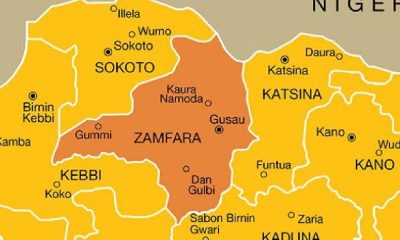Economy
FCT, Ogun, Lagos receive 1,000 CNG kits

The Federal Government says it has commenced distribution of fresh Compressed Natural Gas kits to some states of the federation in its drive to foster rapid adoption of CNG.
This was disclosed Friday by an official of the Presidential Compressed Natural Gas Initiative, Moses Onate, during an inspection of the CNG kit warehouse located in Ibafo, along the Lagos-Ibadan Expressway, Ogun State.
With the hike in fuel prices, many drivers claimed they have been struggling to keep their businesses afloat.
The exercise, which the Federal Government said could reduce the cost of transportation by over 40 per cent started in Abuja and Lagos.
Speaking on the distribution Onate noted that states like Lagos, Oyo, Kaduna, Ogun and the FCT would be getting 1,000 conversion kits to continue the conversion initiative.
Onate added that of the 1,000 kits made available to the warehouse, 450 have been distributed to Kaduna and Abuja while 550 would be distributed to Lagos, Ogun and Oyo.
He said, “As of this morning, 450 have gone out to Kaduna and Abuja. 550 will be going to Lagos, Oyo, and Ogun states today.”
He also said the FG had not got any negative feedback on the kits distributed previously.
According to him, there are up to 10 CNG conversion centres in Lagos State alone.
“This initiative will seriously help people as regards the cost in the sense that fuel is around a thousand naira now, but CNG is around N210/N230.
“The gross margin between what fuel is being sold for and CNG price will have a lot of positive impact on everybody. We will live to enjoy CNG,” he said.
In his reaction, a pipeline engineer at the warehouse, Austin Nwaodhu, urged motorists and vehicle owners to adopt the CNG initiative stressing that it offers a cheaper alternative to fuel because of its low consumption rate, and user-friendliness.
He added that CNG did not emit much fumes into the atmosphere which could cause harm to members of the public.
“CNG is a good initiative by the president that will help to bring down the cost of running a vehicle compared to petrol. It will bring down the cost of running our cars.
“It is friendly to the environment and does not emit fumes unlike petrol,” Nwaodhu stressed.
Economy
Naira Records Marginal Decline Against Dollar at Official Market

The Nigerian naira experienced a mild drop in value on Friday, closing at ₦1,602.18 per dollar in the official foreign exchange market, based on figures released by the Central Bank of Nigeria (CBN).
This marks a decrease of ₦5.49 from the rate of ₦1,596.69 recorded on April 30, the last trading day before the May 1 Workers’ Day holiday—indicating a depreciation of approximately 0.34%.
Earlier in the week, from Monday to Wednesday, the naira remained relatively stable, exchanging at ₦1,599.95, ₦1,599.71, and ₦1,596.69 respectively.
Although the local currency showed some consistency mid-week, it wrapped up the week with a loss, following a sligh dip of 0.02% at the beginning of the week
Economy
Black Market Dollar hits N1,610 Amid Economic quagmire

What is the Dollar to Naira Exchange Rate in the Black Market (Also Known as the Parallel Market or Aboki FX)?
Below is the black market exchange rate for the U.S. dollar to the Nigerian naira as of Thursday, May 1, 2025. These are the typical rates at which you can exchange dollars for naira:
Dollar to Naira Black Market Exchange Rate (May 1, 2025):
At the Lagos Parallel Market, also referred to as the black market, Bureau De Change (BDC) operators are buying dollars at ₦1,602 and selling at ₦1,610, according to market sources.
Please note: The Central Bank of Nigeria (CBN) does not recognize or endorse transactions conducted on the parallel market. The CBN advises individuals and businesses seeking foreign exchange to use official banking channels.
Economy
Naira nosedives to N1,615/$ in parallel market

The naira depreciated to N1, 615 per dollar in the parallel market from N1,610 per dollar on Monday.
Likewise, the Naira depreciated to N1,602 per dollar in the Nigerian Foreign Exchange Market (NFEM).
Data published by the Central Bank of Nigeria, CBN, showed that the indicative exchange rate for the naira rose to N1,602 per dollar from N1,596 per dollar on Monday, indicating N6 depreciation for the naira.
Consequently, the margin between the parallel market and NFEM rate narrowed to N13 per dollar from N14 per dollar on Monday.
-

 News16 hours ago
News16 hours agoFive Asian countries Nigerians can visit without a visa
-

 Entertainment16 hours ago
Entertainment16 hours agoOld Prophecy Of Pastor About VeryDarkman Goes Viral After His Arrest
-

 News16 hours ago
News16 hours agoTompolo Launches Door-to-Door Campaign for Tinubu’s 2027 Re-Election!
-

 News16 hours ago
News16 hours agoInsecurity! Bandits abduct 25 female wedding guests
-

 News16 hours ago
News16 hours agoEzekwesili slams political establishment over harassment allegation, defends Natasha
-

 News10 hours ago
News10 hours agoINTERPOL uncovers 150 stolen vehicles from Canada in Nigeria, Gambia, other W.A. countries
-

 News3 hours ago
News3 hours agoFormer Plateau deputy governor is dead
-

 News16 hours ago
News16 hours agoKyari breaks silence: “I’m not in EFCC custody, I served God, country, not corruption”





